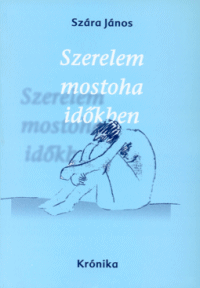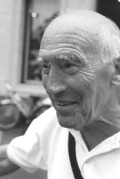|  "Love
in Cruel Times" chronicles a story of true love in post-war
Hungary – a time that witnessed the harshest, often cruel, beginnings
of the Communist era. It is also an authentic account of everyday life
under an oppressive political system where all citizens of a nation are
exposed, often defenselessly, to the raw power of an invisible but nevertheless
real authority, living in constant fear and struggling to survive sometimes
under miserable material conditions. "Love
in Cruel Times" chronicles a story of true love in post-war
Hungary – a time that witnessed the harshest, often cruel, beginnings
of the Communist era. It is also an authentic account of everyday life
under an oppressive political system where all citizens of a nation are
exposed, often defenselessly, to the raw power of an invisible but nevertheless
real authority, living in constant fear and struggling to survive sometimes
under miserable material conditions.
The story involves the late blooming love of a man and a woman, each married
to someone else and having their own families, which raises complex and
painful problems even in normal times. However, when the tentacles of
the communist system reach into the intimate personal affairs of individuals,
the situation becomes quickly unbearable.
“I believe in true love” declares Dr David Buss, professor
in the Psychology Department of the University of Texas at Austin after
spending two decades of his professional life studying and documenting
the dimensions of the evolutionary psychology of human mating.
“While love is common, true love is rare, and I believe that few
people are fortunate enough to experience it. The roads of ordinary love
are well traveled and markers are well understood- the mesmerizing attraction,
the ideational obsession, the sexual afterglow, the often profound self-sacrifice,
the desire to combine DNA. But true love takes its own course, through
uncharted territory. It knows no fences, has no barriers or boundaries.
It’s difficult to define, eludes modern measurement, seems scientifically
woolly. But I know true love exists. I just can’t prove it.”*
When true love happens, usually under extraordinary circumstances, and
recognized as such by a talented writer, it can result in an epic novel.
Such a story in recent times was Boris Pasternak’s “Doctor
Zhivago”. Now there is another such story in “Love in Cruel
Times” written by János Szára in Hungarian and is
currently available only in its original language as “Szerelem Mostoha
Idokben”. A few chapters have been translated to other major languages
and can be sampled on this web-site.
*From “What We Believe but Cannot Prove: Today’s Leading Thinkers
on Science in the Age of Certainty” Edited by John Brockman, Harper
Perennial, New York, 2006.
See [ALL AHF PUBLICATIONS] or go [back
to all AHF news]
|
A Testimonial
"This story is a touching memorial to an extraordinarily feverish
human relationship. Love is generally a personal matter but here, embedded
into the events of an exceedingly brutal and hostile world, it becomes
of general and public interest. The story is not only a convincing and
authentic document of our times, but also it is eminently readable. I
only regret that the actors do not appear under their own names but –
I think – the author had a good reason why he made this decision."
Erno Hárs, writer, poet, translator
About the Author
 János
Szára, was born on June 9, 1918 in Pestujhely, Hungary (now a district
of Budapest). After completing the middle and high schools in
1937 he entered the School of Economics in Budapest where he obtained
a Doctor of Economics degree with “Summa cum Laude” distinction. János
Szára, was born on June 9, 1918 in Pestujhely, Hungary (now a district
of Budapest). After completing the middle and high schools in
1937 he entered the School of Economics in Budapest where he obtained
a Doctor of Economics degree with “Summa cum Laude” distinction.
During the years of 1941-1943 he continued his studies in Rome, Italy
supported by a stipend from the State of Italy. Returning from Rome -
in the fall of 1943 - he entered military service. On Christmas day 1944,
during the siege of Budapest, he was captured by the entering Soviet troops,
but managed to escape.
After the War he has held positions in the Hungarian Ministry of Reconstruction
and in the Hungarian Ministry of Foreign Affairs. In 1949, during a political
reorganization of this Ministry, he was discharged but he found a lower-level
job in an industrial carpentry factory where he worked till 1953. At this
time a slight easing of the policies of the Government of Imre Nagy allowed
him to transfer to the Document Company for the Building Industry as an
editor and translator.
During the Revolution of October 1956 he was elected as President of the
Revolutionary Committee of his Company. Because of this role – after
the suppression of the revolution by Soviet troops - he was forced to
flee the country with his family. They settled in Switzerland where he
worked as an economist at the headquarters of NESTLÉ Company in
Vevey until his retirement in 1983. He still lives in Switzerland (CH-1095,
Lutry).
He contributed professional articles before World War II to the journals
of “Hungarian Kulture” and “Social Reviews”. He
co-authored a textbook for high-schools on “Economic and Social
Studies”. He was the founding member of the Hungarian-Italian Society
until 1948. After this he served as a language instructor at the Italian-Hungarian
Cultural Institute until 1956.
Links
 Sign
up for the AHF mailing list. Sign
up for the AHF mailing list.
Your information is not shared!
Join online!

|



